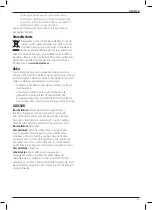
35
EngLIsH
Before Starting
WARNING:
Do not operate this unit until you read
this instruction manual for safety, operation and
maintenance instructions.
Before Each Start-Up
1. Set the Auto On/Off switch
1
to "Off".
2. Remove battery. (Refer to
Installing and Removing the
Battery Pack from the Tool
)
3. Turn the One‑Turn regulator
6
counterclockwise to set the
outlet pressure to zero.
4. Attach hose and tool/accessories.
WARNING: Risk of unsafe operation. Firmly grasp
air hose in hand when installing or disconnecting to
prevent hose whip.
WARNING: Risk of unsafe operation. Do not use
damaged or worn accessories.
nOTE:
The hose or accessory will require a quick connect plug if
the air outlet is equipped with a quick connect body
9
.
WARNING: Risk of Bursting.
Too much air pressure
causes a hazardous risk of bursting. Check the
manufacturer’s maximum pressure rating for air tools
and accessories. The regulator outlet pressure must never
exceed the maximum pressure rating.
NOTICE: Risk of property damage.
Compressed air
from the unit may contain wa ter condensation and oil
mist. Do not spray un fil tered air at an item that could be
damaged by moisture. Some air tools and accessories may
require filtered air. Read the in struc tions for the air tools
and accessories.
How to Start
1. Install the battery into the compressor.
2. Attach hose and tool/accessories.
3. Set the Auto On/Off switch
1
to "Auto On" and allow
tank pressure to build. Motor will stop when tank pressure
reaches "cut‑out" pressure.
4. Turn One‑Turn regulator
6
clockwise to increase pressure
and stop when desired pressure is reached.
nOTE:
Make sure that the desired pressure is not more
than the maximum pressure of the connected hose or the
connected tool.
WARNING: Risk of unsafe operation. If any unusual
noise or vibration is noticed, stop the compressor
immediately and have it checked by a trained
service technician
.
WARNING:
Ensure the regulator is set to a pressure lower
than the maximum operating pressure of the tool.
The compressor is ready for use.
MAINTENANCE
Your
D
e
WALT
power tool has been designed to operate
over a long period of time with a minimum of maintenance.
Continuous satisfactory operation depends upon proper tool
care and regular cleaning.
WARNING: To reduce the risk of serious personal
injury, turn tool off and disconnect battery pack
before making any adjustments or removing/
installing attachments or accessories.
An accidental
start-up can cause injury.
The charger and battery pack are not serviceable.
Customer Responsibilities
Before each use Daily or after each use
Check Safety Valve
X
Drain Tank
X
Check for air leaks
X
Check for unusual noise/vibration
X
Check hose and tool connection
X
Adjustment of pressure control
X
WARNING:
Risk of unsafe operation.
Unit cycles
automatically when power is on. When performing
maintenance, you may be exposed to voltage sources,
compressed air, or moving parts. Personal injuries can
occur. Before performing any maintenance or repair,
disconnect power source from the compressor and bleed
off all air pressure.
nOTE:
Refer to the
Operation
section for the location
of controls.
To Check Safety Valve (Fig. E)
WARNING: Risk of Bursting.
If the
safety valve does not work properly,
over-pressurization may occur, causing air
tank rupture or an explosion.
WARNING: Risk from Flying Objects.
Always wear
certified eye protection with side shields.
Before starting compressor, pull the ring on the safety valve
4
to make sure that the safety valve operates freely. If the valve
is stuck or does not operate smoothly. Contact the
D
e
WALT
service centre.
WARNING:
Do not pull the ring of the safety valve if the
tank is under pressure!
To Drain Tank (Fig. E, F)
WARNING:
Risk of Unsafe Operation.
Air
tanks contain high pressure air. Keep face
and other body parts away from outlet of
drain. Use eye protection when draining as
debris can be kicked up into face.
WARNING:
Risk from noise.
Always wear
proper hearing protection during use. Under
some conditions and duration of use, noise from this
product may contribute to hearing loss.
nOTE:
All compressed air systems generate condensate that
accumulates in any drain point (e.g., tanks, filter, aftercoolers,
dryers). This condensate contains lubricating oil and/or
substances which may be regulated and must be disposed of in
accordance with current regulations.
Summary of Contents for XR FLEXVOLT LI-ION DCC1054
Page 1: ...DCC1054 Final page size A5 148mm x 210mm ...
Page 3: ...1 2 3 Fig A Fig B Fig C Fig D 10 6 5 1 4 9 7 11 2 3 8 Fig E 1 6 4 9 7 Fig F 3 2 12 13 5 ...
Page 169: ......
Page 170: ......
Page 171: ......
















































